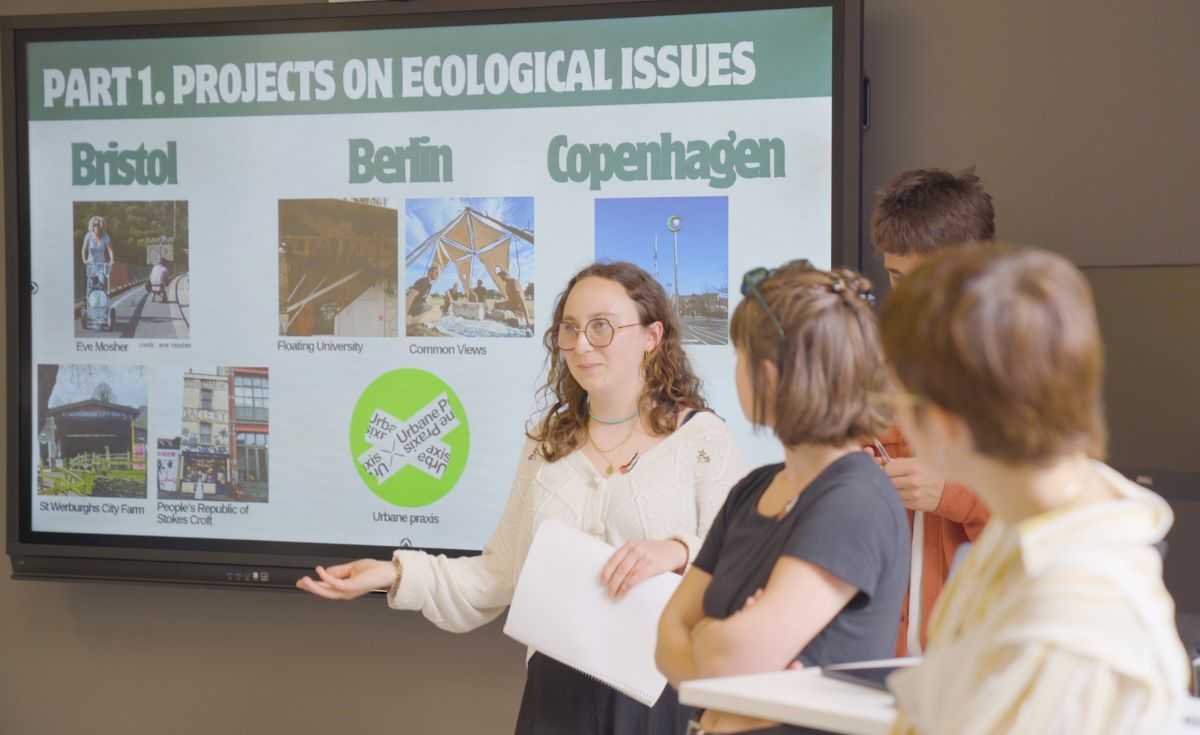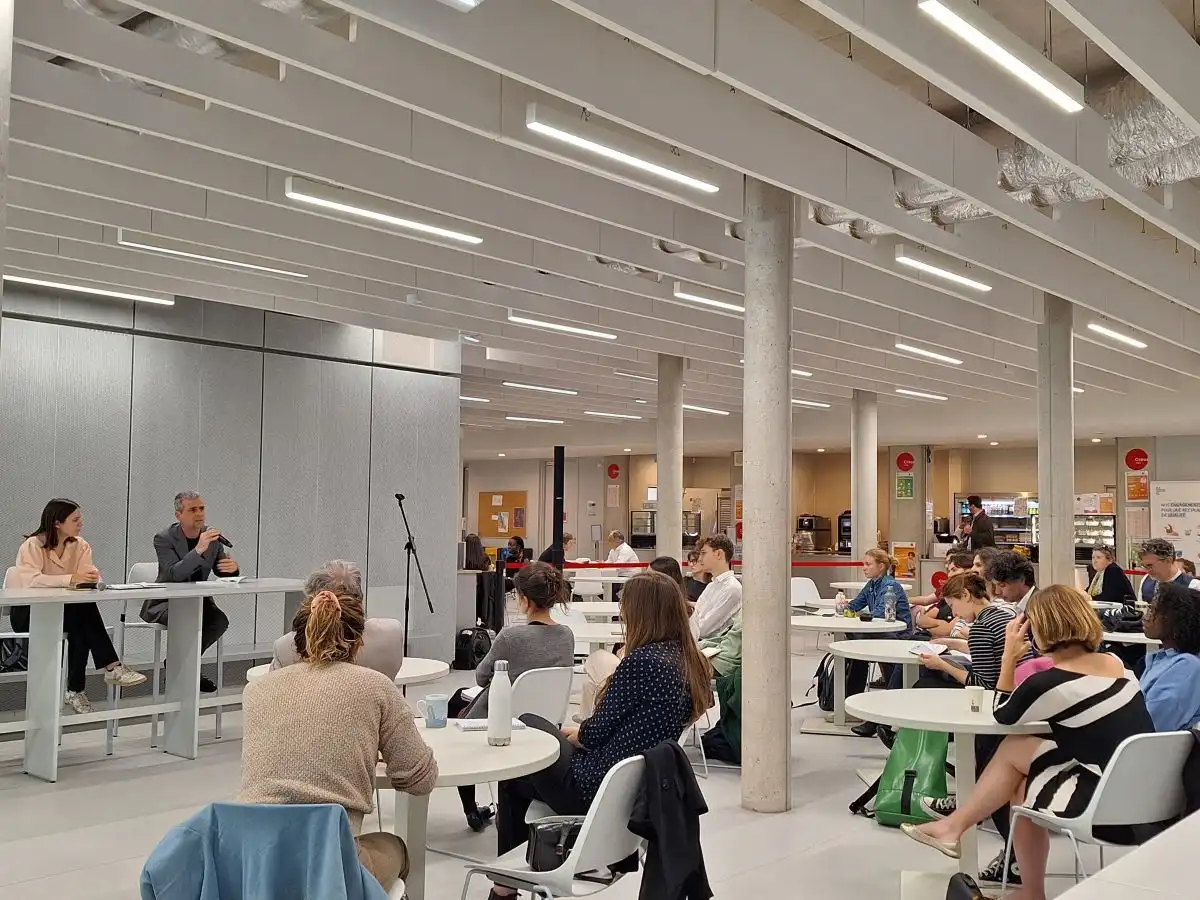Home>Lookback at the Urban School's Lab Day 2024

18.06.2024
Lookback at the Urban School's Lab Day 2024
Look back at the second Lab Day, the highlight of the year's collective projects, held on 11 June 2024 at Sciences Po.
Group projects are a central part of the school's curriculum. Students spend 6 to 9 months working on them, 1.5 to 2 days a week. They address operational and strategic issues public, private, or voluntary organisations propose.
As the academic year draws to a close, the Urban School orchestrates a special event. This is not just a platform for students to present their completed projects but a unique opportunity for them to step outside the academic framework and engage with an external audience of professionals. They share their results not only with their peers but also with all the School's partners and the various communities involved.
This event encourages dialogue and exchanges between the various projects, enabling students to compare their ideas and benefit from a wide range of feedback. By bringing their results to the public's attention, they demonstrate the tangible impact of their work and contribute to advancing knowledge in their field.

Plenary session: The ecological transition of working-class neighbourhoods
In the presence of: Tommaso Vitale, Dean of the Urban School, Manisha Anantharaman, Assistant Professor at the Centre de sociologie des organisations and Hélène Peskine, Permanent Secretary of the Plan Urbanisme Construction Architecture.
This year, we have chosen to organise the introductory plenary session on the link between social and ecological issues based on French, European, and international case studies. The two problems are closely linked: we know that extreme climatic events have an impact on the most socially vulnerable populations and that, at the same time, specific ecological transition policies can penalise them and generate large-scale social movements, as demonstrated by the success of the slogan "end of the world, end of the month". The PUCA's request to the Urban School concerned the need to disentangle these two issues based on three questions:
- What are the specific issues at stake in the relationship between environmental and social problems in working-class neighbourhoods?
- What are the key figures (public policies, mechanisms, initiatives) through which this relationship manifests itself?
- What are the most exciting and promising avenues to be explored or developed to integrate environmental and social issues for the benefit of people living in working-class neighbourhoods?
Replay available soon
The forty or so collective projects for 2023-2024 were then presented and discussed in 19 workshops on themes as varied as "Planning and implementing the ecological transition", "Housing young people and senior citizens", "Innovating to understand mobility better", and "Frugalité et sobriété, des sols aux matériaux". Following the plenary session, we look back at two workshops on ecological and social issues.
Putting water issues on the agenda
This workshop, led by Christophe Defeuilly, a lecturer at the Urban School, brought together two projects: "Freshwater management in the Mediterranean" (Master GETEC, Fédération Nationale des Agences d'Urbanisme) and "Water as the basis of a project in Seine-Saint-Denis" (Master in Urban Planning, Direction de l'eau et de l'assainissement du Département de Seine-Saint-Denis).
Students from the Master Cycle in Urban Planning worked with the Seine-Saint-Denis Direction départementale de l’Eau et de l’Assainissement, which assigned them to redefine and materialise the place of water in the department, "both in perceptions and in planning practices." They created an operational and graphic tool, the "Révélateur," to facilitate consideration of and dialogue about water between the various players in the urban fabric.
Today, the water issue is particularly relevant because of the growing impact of climate change. This has led to severe droughts and frequent flooding, exacerbating the challenges of managing this vital resource.
Water is a crucial issue for future urban planners because of its impact on health, the environment, the economy and quality of life. Effective water planning and management are essential to creating resilient, sustainable and liveable cities. By considering these issues, we can prevent future crises, ensure an equitable distribution of resources and protect natural ecosystems.
The factory of urban inclusion
This workshop, led by Guillaume Pavageau, Operational Director of Espacité, brought together two projects: "Welcoming and integrating displaced people in the city" (Master Governing the Large Metropolis, AIMF) and "The inclusive city: a new urban model" (Master Regional and Urban Strategy, ANAH).
The mission entrusted to the students by the ANAH was to develop a reflection on the inclusive city and explore its means of implementation and financing. The students proposed consistent ways of thinking about the various levers of the inclusive city—housing, for example.
Urban inclusion is an emerging and crucial topic today. It responds to the growing challenges of socioeconomic inequalities and the impacts of climate change while aiming to create resilient, sustainable, and inclusive cities. Urban inclusion involves designing and implementing policies and infrastructures that promote equal access to housing, employment, public services, education, and public spaces.

Get involved in 2025 !
Would you like to propose a group project to our students? See the call for projects 2024-2025 and the application procedure.
Information Sessions: Masters

Find out more about the Masters programs and the wide choice of specialisations offered by the 8 Schools of Sciences Po during our webinars dedicated to applicants.